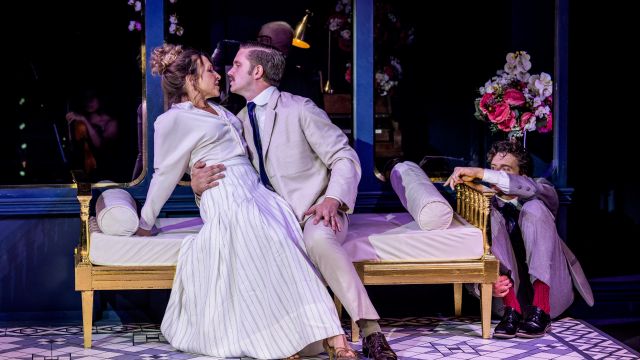A Little Night Music
A Little Night Music at the Hayes took me on a retro 50-year flashback to a revelatory night at the then new, now gone, Her Majesty’s Theatre in Sydney; an evening which redefined the possibilities of musical theatre for me.
Spellbound, I returned on student rush tickets as often as my teaching scholarship funds allowed.
Reaching Sydney in November 1973, just nine months after its Broadway premiere, the latest Tony Award winner had leapfrogged Sondheim’s recent revolutionary pieces, Company and Follies, onto our stages. I could only envisage those as theatre of the mind, while listening to the cast recordings on vinyl.

Elegant and sophisticated, this ‘Art House’ musical, based on an ‘Art House’ film, Ingmar Bergman’s 1955 Smiles of a Summer Night, had somehow snuck into a major commercial theatre.
Sometimes you could mistake it for an operetta, with its waltz-driven score, until you couldn’t. The lavish early 20th century sets and costumes certainly helped. Yet the elegantly packaged show went way beyond operetta (or musical comedy) boundaries, with its web of entangled relationships and infidelity; intricate contrapuntal songs, unifying drama with music; adult wit; and a small ensemble, rethought along classical Greek chorus lines, which intertwined with, and flitted through, the main action, offering a knowing commentary. A Little Night Music delighted with each new twist and surprise.

2023 Hayes Theatre audiences no longer come to A Little Night Music quite so influenced by the song and dance, boy meets girl musicals which were still staples on our diet in 1973. Our perception now is vastly re-shaped by Sondheim’s entire output – hits and now-revered flops – plus breadth of his influence across half a century of writers and composers.
Director Dean Bryant’s impressive new salon production distils the musical for the intimate Hayes space. Jeremy Allen’s attractive simple single set, with minimal props moved by the cast, serves for all locations, while chamber orchestrations do great service to the score under the musical direction of David Gardos and Michael Tyack. Physical immediacy proves powerful and engaging.

Lawyer Frederik Egerman, his second marriage to his much younger second wife Anne unrequited, seeks solace in the arms of his former lover, glamorous actress Desiree Armfeldt, only to be surprised in her apartment by her jealous current lover Count Carl Magnus. Desiree subsequently inveigles a weekend invitation for Frederick’s family to visit her mother’s country estate, culminating in the marvellous Act 1 finale, “A Weekend in the Country”, with Carl Magnus catching wind of the plans, and gate-crashing with his wife Charlotte. Untangling the complex web of relationships in Act 2, reveals new threads of love, and love renewed.
Blazey Best’s gloriously seductive diva Desiree Armfeldt is the force of nature at the heart of this production. The eternal triangle she shares with the two contrasting leading men (Leon Ford’s frequently bemused, intense lawyer Frederik Egerman and the gormless, swaggering, pompous, broadly comedic Count Carl Magnus of Joshua Robson) impacts the lives and loves all around them.
The intertwined youthful naivete of both Jeremi Campese’s Henrik (Frederik’s son) and Melanie Bird’s Anne (Frederik’s wife) is engaging and amusing. The absolute synergy of Henrik’s song “Now”, self-accompanied on the cello by Campese, is an early show highlight.
Erin Clare brings a wry, sarcastic edge to long-suffering, quietly simmering Countess Charlotte, wife of the philandering Carl Magnus. Clare and Bird’s super rendition of the duet “Every Day a Little Death”, arouses empathy, and laughs with afterburn.
Kiana Danielle’s down-to-earth, pragmatic maid Petra mines every ounce of earthiness from her song “The Miller’s Son”, bringing spark and vibrance to the role.
Pamelia Papakosta’s Frederika Armfeldt (Desiree’s daughter) is a vivacious joy.
 Nancye Hayes’ knowing matriarch Madame Armfeldt totally owns the stage (of the theatre which shares her name) with the extra-ordinary stage presence we know and love, from each entrance to each exit.
Nancye Hayes’ knowing matriarch Madame Armfeldt totally owns the stage (of the theatre which shares her name) with the extra-ordinary stage presence we know and love, from each entrance to each exit.
My one disappointment is the interpretation of the ‘Liebesleider’, the ensemble of five performers mentioned earlier. In the original production, they hovered elegantly, then glided seductively through the action, adding their eloquent, suggestive insights. Here, the excellent young singers from Sydney Conservatorium are behind the open panels of the set with the musicians, more like booth singers in a recording studio. It’s probably a space issue, but with all the other performers sitting in chairs around the perimeter of the stage when not involved in the action, it struck me that the ‘Liebesleider’ might easily be better integrated.
A review of A Little Night Music feels incomplete, though, without mention of Sondheim’s (probably) most famous song, so here goes.
Once again remembering that night 50 years ago, one last big surprise in an era when musicals ended with big all-singing, all-dancing finales, was the subdued, intimate close of the show, a reflective duet between Frederick and Desiree, the continuation of her earlier ballad “Send on the Clowns”. Going way beyond the conventional reprise we were used to, it artfully steers their relationship toward a potential future. Blazey Best and Leon Ford make that finale moment poignant and promising.
Neil Litchfield
Photographer: John McCrae.
Subscribe to our E-Newsletter, buy our latest print edition or find a Performing Arts book at Book Nook.

